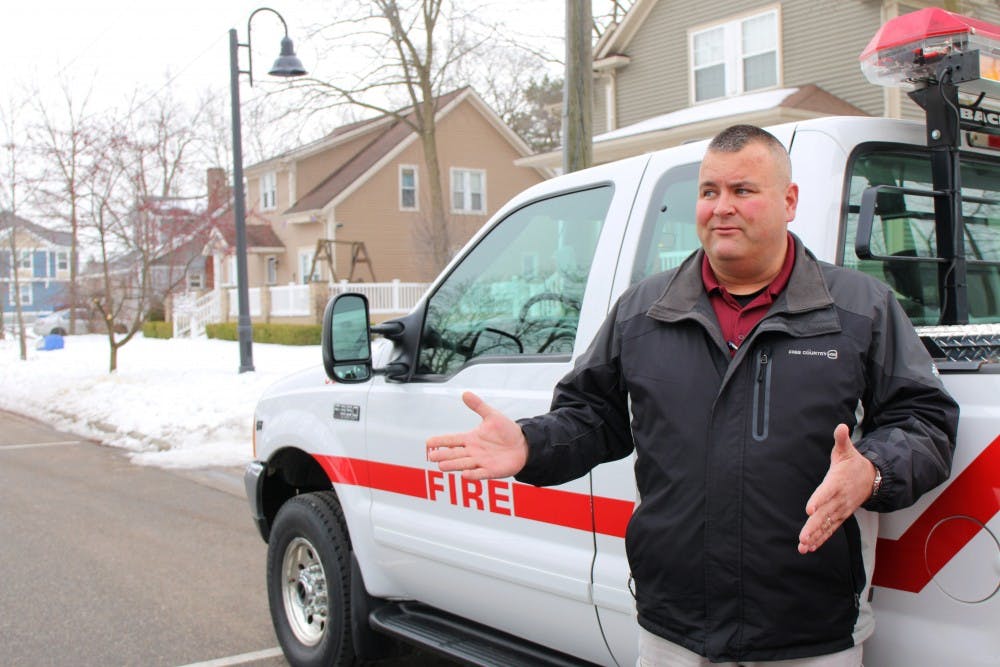Code enforcement polices trash, parking in student neighborhoods
If you live between Bellows and High Streets, it's difficult to avoid a code violation if there is trash on your lawn or your car is parked in the wrong place.
That's because one of three code enforcement officers in Mount Pleasant was hired to focus on student-populated neighborhoods north of campus. Kris Crawford, the city's newest officer, works solely in that area.
"When I was hired, the biggest thing is (the city) wanted partnerships with the Greek community and students, as well as owner-occupied homes," Crawford said. "They want to try to build a relationship between the students and owners too, so there's not that butting heads, so to speak."
Since he started in September, Crawford, who spent most of his career working as a dispatcher for the Saginaw Chippewa Indian Tribe, has written 196 "corrective notices" north of campus.
As a rule, code enforcement officers first issue a corrective notice, usually a note tacked to the front door of the property, which specifies a time the violation needs to be corrected. If the issue isn't corrected, a $50 fine is issued as a municipal civil infraction. Students who receive these fines must appear in court.
Before writing citations, however, Mount Pleasant Fire Lt. Michael Dunham, who oversees code enforcement, said the city is more focused on education, especially when it comes to the most common violations: Trash, parking and indoor furniture.
"Tickets are the last thing we want to do," he said. "We would rather work with the students to gain compliance through cooperation. It's not our goal to be a thumb on our students. We want them to exist here, to be successful, to be happy -- we just want them to be good citizens while they're here."
Common violations
Since 2012, the city has issued 2,822 corrective notices for trash, with 1,618 of those in the area north of campus.
"The biggest one is solid waste -- trash bags outside of the bins, getting people to utilize their bins," he said.
Dunham echoed Crawford, adding trash in the yard and on the porch, outside of the designated trash bin will result in a corrective notice. Second, Dunham said, is parking, a multi-faceted issue.
"We have a lot of yard parking by our students," he said. "They have to be parking on a hard surface. They might park across the sidewalk on a drive, so people who walk to class now can't traverse that."
He added students have parked on city streets to avoid buying campus parking passes. Many of these students, he said, park in restricted areas, which results in tickets. However, some areas are open to park on, like Lansing Street. But there is no overnight parking allowed on city streets from December until April.
Dunham noticed some students keep indoor furniture outside, whether on the lawn, deck or porch. This is also considered a code violation.
Fees and alternative programs
If an officer has to return for a second violation within the same calendar year, the violation automatically becomes a second offense. The fee increases by $50 per resident. Officers may notify landlords if residents aren't cooperative, which could tack on extra fees. Infraction fines can go up to $250.
Crawford said during his daily routine, he visits homes where corrective notices were posted to check if residents complied. If not, he issues an infraction.
"I do a lot of follow ups, making contact with different people in the neighborhood," he said. "I drive up and down (Bellows to High streets) and look for code violations."
Instead of paying fees, students could opt to do community service instead. If it is a first offense, they can work through the city attorney's office to complete 24 hours of community service in lieu of ticket fines.
"If you get a violation for waste, community service might be picking up waste," Dunham said. "It shows that this is what we don't want in our community."
A means of communication
When the city voted to hire the new code enforcement officer, members of the city commission cited forming stronger relationships between the city and students as a reason, aside from frequent code violations.
Dunham said a large part of Crawford's job is educating the public. Before his hire, there were only two officers to cover the entire city.
"We started to think that if we had somebody there on a regular basis, they could start making relationships," Dunham said. "(Crawford) is on a first-name basis with some of those students. I think we are modifying some behaviors."
For Crawford, who is a self-proclaimed people-person, getting out from behind a desk and into the neighborhoods is what he likes about his job. He said he doesn't enjoy writing infractions, but that is part of his job, tooo.
"The big challenge for me is if we can gain those partnerships, versus hearing, 'Code enforcement is coming and they're going to give me a ticket' -- that's not what I want."




